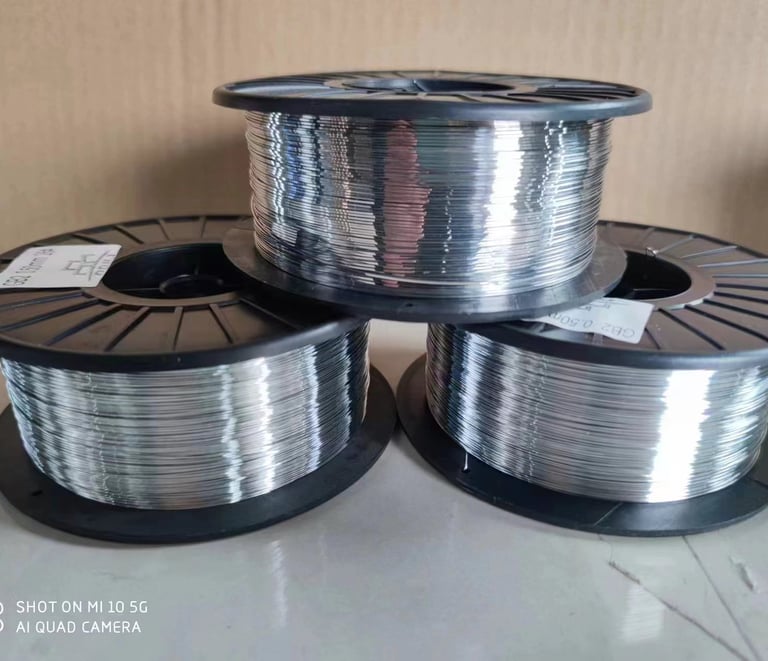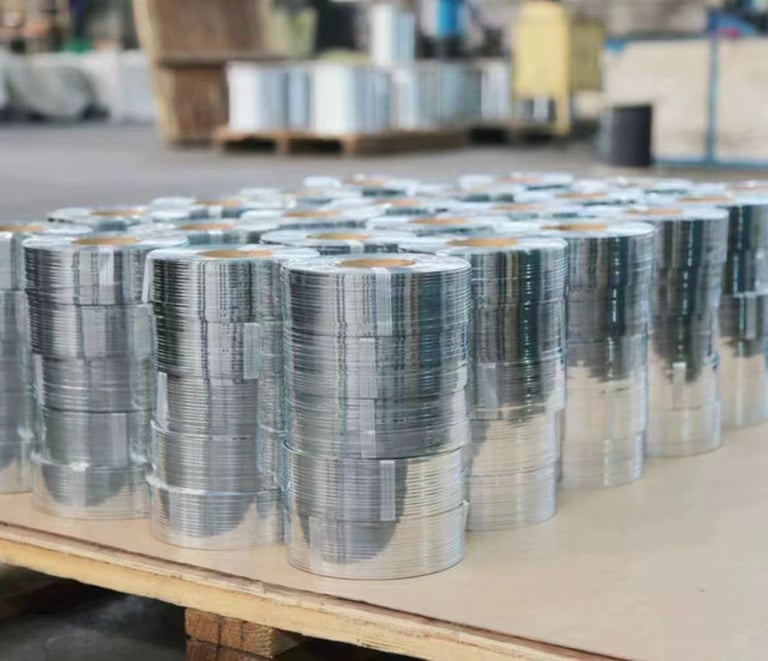The Multifaceted Applications of Galvanized Wire in Modern Industries
INDUSTRIAL SUPPLIES
1/23/20245 min read


Galvanized wire, known for its durability and resistance to corrosion, plays a pivotal role in various industries. From automotive and packaging to furniture, agriculture, and construction, galvanized wire products like galvanized staple wire, iron wire, wire rope, and wire mesh have become essential. This blog delves into the diverse applications of galvanized wire, highlighting its importance across multiple sectors.
Understanding Galvanized Wire
Galvanized wire is steel wire coated with a protective layer of zinc to prevent rusting. This process, known as galvanization, enhances the wire's durability and extends its lifespan, making it suitable for a wide range of applications. Key types of galvanized wire include:
Galvanized Staple Wire: Used in staple guns for securing various materials.
Galvanized Iron Wire: Versatile wire used in construction, agriculture, and manufacturing.
Galvanized Wire Rope: Strong, flexible wire rope used in heavy lifting and securing loads.
Galvanized Wire Fence: Durable fencing material used in agriculture and security.
Galvanized Wire Nails: Corrosion-resistant nails used in construction and carpentry.
Galvanized Wire Mesh: Mesh made from galvanized wire, used in fencing, reinforcement, and filtering.
Galvanized Steel Wire: High-strength wire used in a variety of industrial applications.
Applications in Various Industries
Automotive Industry
In the automotive industry, galvanized wire is crucial for ensuring the safety and longevity of vehicle components. It is used in several applications:
Wire Rope: Used in vehicle winches and control cables, galvanized wire rope provides the necessary strength and flexibility.
Fasteners and Nails: Galvanized wire nails and fasteners ensure secure assembly of automotive components, resisting corrosion even in harsh environments.
Reinforcement: Galvanized wire is used to reinforce rubber hoses and belts, enhancing their durability and performance.
Packaging Industry
The packaging industry relies on galvanized wire for its strength and resistance to damage. Key applications include:
Packaging Wire: Used to bind and secure packages, ensuring they remain intact during transit.
Carton Staples: Made from galvanized staple wire, these staples are essential for sealing boxes and cartons.
Strapping Seals: Galvanized wire is used to manufacture strapping seals, which secure heavy packages and pallets.
Staple Guns: Tools that use galvanized staple wire to fasten packaging materials quickly and efficiently.
Stretch Film Dispensers: Galvanized wire components are used in the construction of dispensers, ensuring durability and smooth operation.
Furniture Industry
Galvanized wire is integral to the furniture industry, providing strength and durability to various components:
Cabinet Hardware: Galvanized wire is used in making hinges, handles, and other hardware that resist corrosion and wear.
Upholstery Staples: These staples, made from galvanized staple wire, are used to secure fabric to furniture frames.
Chair Springs: Galvanized steel wire is used to make springs that provide support and comfort in chairs.
Furniture Frames: Galvanized wire mesh and wire are used in the construction of sturdy furniture frames.
Bedding Wire: Used in mattresses and box springs, galvanized wire ensures long-lasting support and comfort.
Agricultural Industry
In agriculture, galvanized wire products are essential for various applications, contributing to efficiency and durability:
Fencing Wire: Galvanized wire fence is used to create strong, durable enclosures for livestock and crops.
Mesh Wire: Used for constructing pens, cages, and protective enclosures.
Concrete Reinforcement Wire: Galvanized wire is used to reinforce concrete structures in agricultural buildings.
Scaffolding Fasteners: Essential for building and maintaining agricultural infrastructure.
Staple Wire: Used for securing fencing and other materials in agricultural settings.
Construction Industry
The construction industry heavily relies on galvanized wire for its strength, flexibility, and resistance to corrosion. Key applications include:
Reinforcement Wire: Galvanized wire is used to reinforce concrete in foundations, walls, and other structures.
Roofing Nails: Made from galvanized wire, these nails are used to secure roofing materials, providing long-lasting protection against the elements.
Fencing Wire: Used for perimeter security and property delineation in construction sites.
Scaffolding Fasteners: Galvanized wire fasteners ensure the stability and safety of scaffolding structures.
Mesh Wire: Used in creating reinforced concrete slabs and walls, providing additional strength and stability.
The Manufacturing Process of Galvanized Wire
The manufacturing process of galvanized wire involves several steps to ensure the wire's strength, durability, and resistance to corrosion:
Wire Drawing: Steel wire is drawn through a series of dies to achieve the desired diameter.
Cleaning: The wire is cleaned to remove any impurities or residues that could affect the galvanization process.
Annealing: The wire is heated to a high temperature and then slowly cooled to improve its ductility and strength.
Galvanization: The wire is coated with a layer of zinc through hot-dip galvanizing or electro-galvanizing. Hot-dip involves immersing the wire in molten zinc, while electro-galvanizing uses an electric current to apply the zinc coating.
Cooling and Inspection: The galvanized wire is cooled and inspected to ensure it meets quality standards.
Advantages of Galvanized Wire
Galvanized wire offers numerous advantages that make it a preferred choice across various industries:
Corrosion Resistance: The zinc coating protects the wire from rust and corrosion, extending its lifespan.
Durability: Galvanized wire is strong and resilient, capable of withstanding harsh environments and heavy use.
Versatility: Available in various forms and sizes, galvanized wire can be used in a wide range of applications.
Cost-Effective: While the initial cost may be higher than non-galvanized wire, the long-term benefits and reduced maintenance costs make it a cost-effective solution.
Environmental Resistance: Galvanized wire can withstand exposure to moisture, chemicals, and extreme temperatures, making it suitable for outdoor and industrial applications.
Challenges and Considerations
While galvanized wire offers many benefits, there are some challenges and considerations to keep in mind:
Initial Cost: The cost of galvanized wire is higher than non-galvanized alternatives, which may be a consideration for some projects.
Weight: Galvanized wire can be heavier than other types of wire, potentially impacting handling and installation.
Zinc Coating Thickness: The thickness of the zinc coating affects the wire's durability and performance. It's essential to choose the right coating thickness for the specific application.
Future Trends in Galvanized Wire
The demand for galvanized wire is expected to grow, driven by advancements in technology and increasing applications in various industries. Future trends include:
Enhanced Coating Technologies: Advances in galvanization techniques will lead to more efficient and environmentally friendly coating processes.
High-Performance Alloys: Development of new alloys and materials will enhance the strength and durability of galvanized wire.
Automation and Robotics: Increased use of automation and robotics in manufacturing will improve the precision and efficiency of galvanized wire production.
Sustainable Practices: The industry will continue to adopt sustainable practices, reducing the environmental impact of galvanized wire production.
Conclusion
Galvanized wire is a versatile and essential material in modern industries, offering unmatched durability, strength, and corrosion resistance. Its applications span automotive, packaging, furniture, agriculture, and construction, highlighting its importance in various sectors. As technology and materials continue to advance, the role of galvanized wire will only grow, driving innovation and efficiency in manufacturing and industrial processes. Whether for reinforcing structures, creating secure enclosures, or crafting durable components, galvanized wire remains a cornerstone of modern industry.


